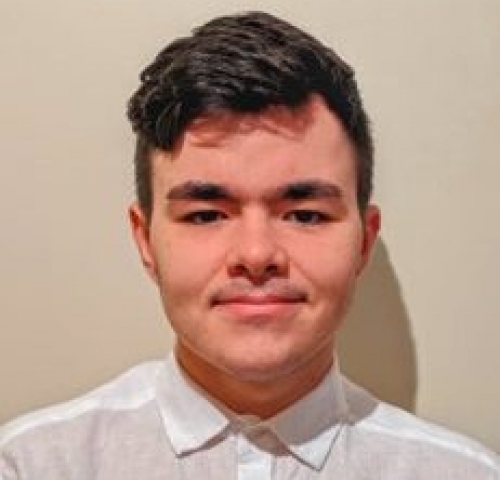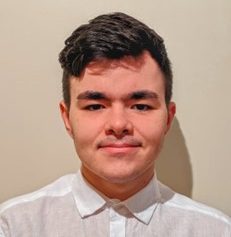
Luke Filippini
Queensland University of Technology
I am a student at the Queensland University of Technology (QUT) in Brisbane in the final six months of my Master of Philosophy (MPhil) in mathematics. I started my MPhil in February 2022 after achieving my Bachelor of Mathematics degree (2019-2021), also at QUT, majoring in both Applied and Computational Mathematics and Statistics. I decided to undertake further study because I’m passionate about maths and wanted to improve on my research, project management, collaboration, and time management skills, to name a few. I was inspired to take on my own project after I completed a smaller six-week project with my current principal supervisor as part of the AMSI Summer Vacation Research Experience Scheme (Dec 2021-Feb 2022). This sparked and contributed to a keen interest I have in research and further study. I have also worked as a sessional academic in a variety of undergraduate units at QUT since I started my MPhil, and I also do some private tutoring work with high school students on the side. My current intention is to begin a PhD soon after I finish my MPhil.
Can you give me a quick rundown about the type of mathematics you are studying and its potential impacts for the broader community?
My main area of study is applied and computational mathematics, and I’m currently focused on modelling and approximating diffusion-controlled processes. The work I’m undertaking has potential practical applications in drug delivery and the drying of thin discs of food products. The primary research aim of my MPhil is to develop new simplified models of diffusion in radially-symmetric geometries, such as spheres and discs. These simple models approximate more complex models of diffusion and allow experimental data to be more easily analysed. To be more specific, these models allow the effect of characteristics, such as the size, shape, and material properties, of, for example, a drug device or thin food product on the release profile to be more easily interpreted. This could potentially aid the optimisation of drug delivery devices or drying chambers for a desired purpose.
How did you get into mathematics? Was there someone or something that inspired you into this field?
I didn’t know what I wanted to study after high school at all. I originally planned to study information technology, and I included mathematics with it as part of a double degree option based on a whim. After starting that degree at QUT, I quickly realised that studying information technology was not for me, and I switched to a single degree in mathematics. It was one of the best choices I have made. It helped that I had the same great mathematics teacher for the last three years of high school.
Throughout my undergraduate degree, I became more passionate about mathematics, and I particularly enjoyed the computational mathematics units delivered by my now principal supervisor, Dr Elliot Carr. I approached him at a research information session in August 2022, and he has guided me through an AMSI VRES project as my sole supervisor and as a co-supervisor for my MPhil since then. Recently, the AMSI Summer School experience has only made me more inspired to continue with mathematics.
You received a Travel Grant to attend AMSI Summer School 2023. How important was this in terms of your ability to attend, fully participate in the program and meet others studying in similar fields?
I was very fortunate to receive a Travel Grant to participate in the Summer School. This covered my accommodation costs entirely, and I was able to stay in a room in a college right next to the campus for two weeks. The best part of this experience was that many of us were staying in the same place, so I was able to casually chat and get to know people and their interests over breakfast and dinner. Having the first two weeks of the summer school in-person meant I was able to collaborate effectively with both my peers and the lecturer in class as well. I feel as if I made many great connections with others and learnt far more personally and academically than I could have if the entire program was online.
What was the most valuable part of the program for you?
The most valuable parts of the program for me were getting the opportunity to meet and collaborate with new people, take part in the social events, present at the participant talks and attend the careers day. I valued having the opportunity to present my work in a general way to new faces and watch other students present. It helped me understand my research more and figure out ways to present it more clearly to a broad audience of mathematics students.
In the long-term, what do you think are the benefits of having attended Summer School?
I believe AMSI Summer School has aided me greatly in establishing new professional and personal connections with others that may come in handy in the future. It has also helped me improve on my presentation and collaboration skills. It also exposed me to a greater range of mathematical topics that I could look in to, both from my courses and from discussions with other people. I think it has also helped foster a deeper passion for mathematics and possibly further study.
Summer School included a special Careers Day program which aims to help give students an idea of the kinds of career paths available to maths graduates in industry and private sector research areas. Were you previously aware of the types of industry opportunities available to mathematical science graduates?
The careers day was a major highlight of the Summer School. I really enjoyed the opportunity to chat with industry representatives about the options available. I was not previously aware of some of the industry opportunities, particularly in trading and national security. I was excited by the internship and graduate programs available in these areas, so it’s definitely a path I would consider taking. I feel much better equipped to explore these and other opportunities and after attending the careers day. As a bonus, it was a great way to practice introducing myself and making a good pitch.
What advice would you give to someone who is considering applying for Summer School in 2024? Should they apply and why?
If you are thinking about doing the Summer School and can be there in-person, do it! It’s a unique experience. You will make great connections with other like-minded people. From my experience, the course I took was excellent and well-delivered, and it’s also a good opportunity to explore not only different mathematical topics but potentially a different city than your own. The careers day is a great highlight as well.
Where do you want the mathematical sciences to take you? Where do you see yourself in five, ten years time?
Currently, I’m seeking to start a PhD after my MPhil and explore industry options from there. The organisations that I was really interested in from the careers day were Optiver, CSIRO and the Australian Signals Directorate. So, those are options I’m considering, but nothing is set in stone and things will change.

